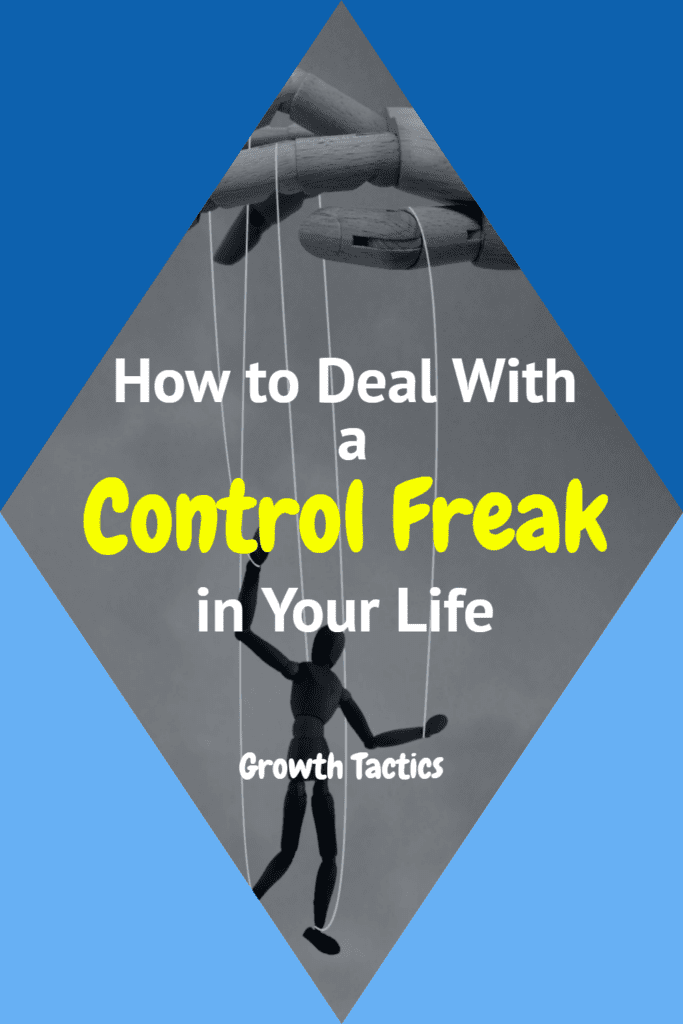Dealing with a control freak in your life can be extremely challenging and draining. Whether it’s a family member, a friend, a coworker, or even a romantic partner, their need for control can create a tense and suffocating environment. However, by understanding the nature of control freaks and implementing a targeted approach, you can effectively manage and navigate these relationships. In this blog post, we will explore various strategies and techniques to help you deal with a control freak in your life.
Jump To Section
Recognizing Control Freaks and Their Behavior
Control freaks tend to exert control over every aspect of their lives and the lives of those around them. They often have control issues and feel the need to micromanage and dominate others. Whether it’s in the workplace or in personal relationships, controlling people can create an abusive and rigid environment, leading to power struggles and negative emotions.
Signs of Controlling Behavior
It is important to recognize the signs of controlling behavior in order to effectively deal with control freaks. Some common signs include:
-
Micromanagement: Control freaks have a tendency to micromanage tasks and scrutinize every detail. They have a hard time trusting others to do things their way and feel the need to oversee every action.
-
Imposing Opinions and Ideas: Control freaks often have an incessant desire to impose their opinions and ideas on others. They believe that their way is the only correct way and can be resistant to alternative viewpoints.
-
Unwillingness to Delegate: Control freaks have difficulty delegating tasks or sharing responsibilities. They prefer to have full control over every aspect and may be reluctant to trust others to handle tasks effectively.
-
Rigid Behavior and Expectations: Control freaks have inflexible behavior and expectations. They have a strict and rigid idea of how things should be done and may become agitated or frustrated if things deviate from their expectations.
-
Constant Need for Reassurance: Control freaks are often insecure and seek constant reassurance that things are being done their way. They may repeatedly ask for updates, demand validation, or express their doubts even when things are on track.
Understanding these signs can help you identify a control freak and anticipate their control-seeking behavior.
Recognizing It’s Not About You
One of the first steps in dealing with a control freak is realizing that their behavior is not about you. They’re acting out of their own need for control, and it has little to do with your competence or worth. Don’t take their attempts to control you personally, as it can often be a reflection of their own insecurities and fear of being vulnerable. By understanding this, you can avoid internalizing their actions and maintain a sense of self-worth.
Remember that control freaks thrive on the power they exert over others. They derive a sense of security and validation from being in control. It is not a reflection of your abilities or shortcomings. By recognizing this, you can detach yourself emotionally from their behavior and focus on finding strategies to deal with their controlling tendencies.
Setting Boundaries and Asserting Yourself
When dealing with a control freak, it is important to establish and maintain clear boundaries. Communicate your needs, preferences, and limits firmly and assertively. Be clear about what you are comfortable with and what you are not willing to tolerate.
Establishing Boundaries
Set boundaries by clearly defining what is acceptable and what is not in your interactions with the control freak. This can include areas such as decision-making, personal space, and work tasks. Clearly communicate your boundaries in a calm and assertive manner, emphasizing your need for autonomy and respect.
Asserting Yourself
Control freaks often have an opinion about everything and may try to impose their ideas and opinions onto you. It is important to assert yourself and make it clear that you value your own thoughts and decisions. Avoid engaging in unnecessary debates or justifying your actions. Remember, you are entitled to your own ideas and opinions.
When asserting yourself, use “I” statements to express your thoughts and feelings. For example, say “I appreciate your input, but I would like the opportunity to do things my way.” By expressing yourself assertively, you can establish your autonomy while maintaining a respectful tone.
Finding a Balance
In situations where a control freak insists on having things done their way, it is important to find a balance between asserting yourself and maintaining a constructive relationship. Instead of engaging in a power struggle, try to find a compromise that satisfies both parties. By finding common ground and showing a willingness to collaborate, you can reduce tension and create a more positive dynamic.
Remember that setting boundaries and asserting yourself may take time and practice. Stay consistent and firm in your communication to help establish a healthier dynamic with the control freak.
Seeking Mediation and External Support
Dealing with a control freak can be emotionally challenging, especially when direct communication and boundary-setting are not effective. In such cases, seeking mediation or external support can provide a helpful solution.
Mediation
What is Mediation?
Mediation involves the involvement of a neutral third party who can facilitate communication, encourage compromise, and find a resolution that is acceptable to both parties.
Role of Mediators
Mediators are trained professionals who can help navigate difficult conversations and assist in finding common ground. They provide an unbiased perspective and help control freaks realize the impact of their behavior on those around them.
Benefits of Mediation
Mediation can be particularly valuable in workplace environments where power dynamics may intensify control issues and create a toxic work environment. It provides a structured and supportive environment for addressing conflicts and finding constructive solutions.
External Support
Importance of External Support
In addition to mediation, seeking support from trusted friends, family members, or professionals can provide you with guidance and reassurance. This external support system can offer a listening ear, empathy, and valuable insights to help you navigate the challenges of dealing with a control freak.
Benefits of Seeking External Support
Talking to someone who has dealt with similar situations can offer valuable strategies on how to cope and maintain your sanity. You don’t have to face the control freak alone; having a support system that understands and supports you can make a significant difference in how you manage the relationship.
Finding Support Groups
Consider joining support groups or forums where you can connect with others who have experienced similar situations. These groups can provide a sense of community, validation, and additional strategies for dealing with control freaks.
By seeking mediation and external support, you can gain valuable assistance in navigating challenging dynamics with control freaks. Remember that it’s okay to reach out for help, and having a supportive network can strengthen your resilience and well-being in the face of controlling behavior.
Maintaining Emotional Well-being
Dealing with a control freak can often be emotionally draining and leave you feeling resentful and frustrated. To maintain your emotional well-being, it’s important to prioritize self-care and focus on your own needs.
Prioritize Self-Care
Make sure to set aside time for activities that bring you joy and help you relax. Engage in hobbies, exercise regularly, practice mindfulness or meditation, and spend quality time with loved ones. Taking care of your physical and mental health is crucial when dealing with a control freak.
Remind Yourself of Your Self-Worth
Control freaks often have perfectionist tendencies and expect everything to be done right. However, it’s important to remember that you don’t need to constantly prove yourself or seek their approval. Remind yourself of your worth and the value you bring. Recognize that your opinion and abilities are valid, even if the control freak tries to dismiss them.
Build Self-Esteem
Focus on building your self-esteem by recognizing your strengths and achievements. Make a list of your accomplishments and remind yourself of them regularly. Surround yourself with positive and supportive people who uplift and validate you.
Practice Self-Compassion
Control freaks may be critical and judgmental, which can affect your self-esteem. Counteract this by practicing self-compassion. Treat yourself with kindness, understanding, and forgiveness. Remind yourself that nobody is perfect and that it’s okay to make mistakes. Be patient with yourself and focus on personal growth rather than seeking approval from the control freak.
Take Control of Your Life
Remember that you have the power to make decisions and take control of your own life. While a control freak may try to dominate and manipulate, it’s important to assert your autonomy and make choices that align with your desires and values. Take ownership of your decisions and trust in your ability to navigate through challenges.
Conclusion
Dealing with a control freak in your life can be a challenging experience, but it’s not impossible. By recognizing control freaks and their behavior, setting boundaries, seeking mediation, and prioritizing your emotional well-being, you can effectively manage these relationships. Remember, it’s important to stay calm and assert yourself while maintaining your own sense of self-worth. Ultimately, by implementing these strategies, you can reduce the negative impact of control freaks on your life and regain control over your own happiness and well-being.


